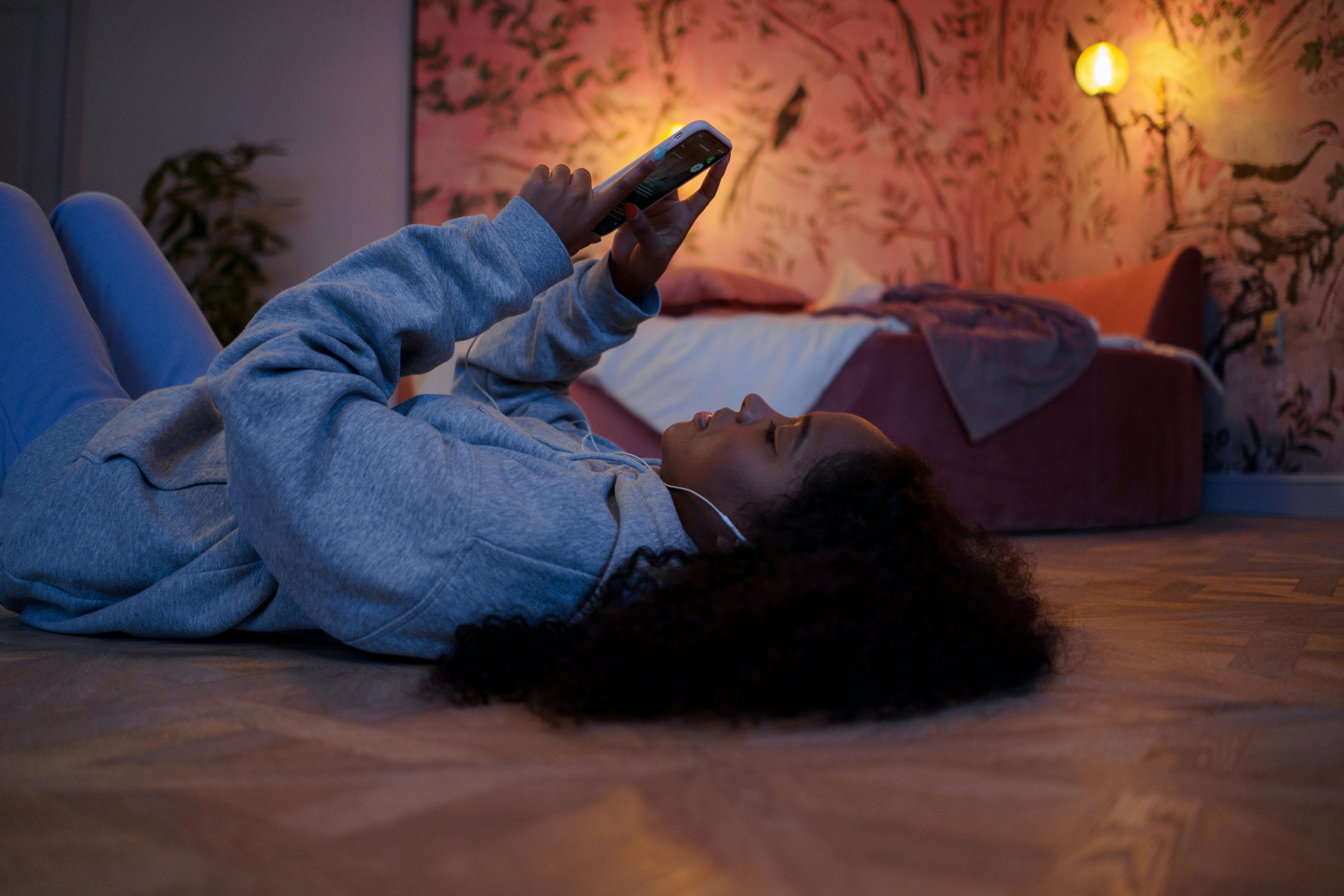Let’s face it: our phones have become more than just tools—they’re our calendars, communication hubs, entertainment centers, and even alarm clocks. While these devices bring incredible convenience, they also have a dark side: digital overload. The constant notifications, endless scrolling, and pressure to stay connected can leave us feeling drained, distracted, and overwhelmed.
Research shows that the average person spends 4 hours and 48 minutes per day on their smartphone, according to a report by Data.ai. This adds up to over 70 full days a year! If you’ve ever felt like your phone is controlling your time—or your peace of mind—you’re not alone. Fortunately, breaking free from phone addiction and managing digital overload is possible with the right strategies.
This guide explores the signs of phone addiction, its impact on your mental health, and practical steps to help you regain control and create a healthier relationship with technology.
What Is Phone Addiction?
Phone addiction, also known as nomophobia (short for “no mobile phone phobia”), is the compulsive use of a smartphone at the expense of time, focus, and mental well-being. It’s not just about excessive screen time—it’s about how the phone’s constant presence affects your ability to disconnect and live in the moment.
Common Signs of Phone Addiction
- Compulsive Checking: Feeling the urge to check your phone constantly, even without a notification.
- Phantom Notifications: Thinking you heard or felt your phone buzz, even when it didn’t.
- Anxiety When Disconnected: Feeling uneasy or stressed when your phone isn’t accessible.
- Time Blindness: Losing track of time while scrolling or using apps.
- Neglecting Responsibilities: Letting phone use interfere with work, relationships, or self-care.
The Impact of Phone Addiction and Digital Overload
Phone addiction doesn’t just steal your time—it can have far-reaching effects on your mental, physical, and emotional well-being.
1. Mental Health
- Increased Anxiety and Depression: A study in Computers in Human Behavior found that excessive social media use is linked to a 66% higher risk of anxiety and depression.
- Decreased Attention Span: Constant notifications and multitasking can train your brain to crave distractions, making it harder to focus.
2. Sleep Disruption
- Blue Light Exposure: Phones emit blue light that interferes with melatonin production, making it harder to fall asleep.
- Screen Time Before Bed: A study by the National Sleep Foundation found that people who use their phones before bed are 70% more likely to report poor sleep quality.
3. Relationship Strain
- Reduced Quality Time: Being glued to your phone during conversations or shared activities can harm relationships.
- “Phubbing” (Phone Snubbing): Ignoring people in favor of your phone creates distance and resentment.
4. Productivity Loss
- Interruptions: It takes an average of 23 minutes to refocus after a distraction, according to Gloria Mark, PhD at the University of California. Constant phone checks can derail your workflow.
How to Overcome Phone Addiction and Digital Overload
Breaking free from phone addiction doesn’t mean abandoning technology altogether. It’s about creating boundaries and reclaiming control. Here’s how to start.
1. Understand Your Phone Habits
The first step to change is awareness. Take an honest look at how, when, and why you use your phone.
Tools to Track Usage:
- Screen Time (iOS) or Digital Wellbeing (Android): Built-in tools that show how much time you spend on your phone and which apps you use the most.
- Third-Party Apps: Apps like Moment or RescueTime offer detailed insights and tips for reducing screen time.
Example: You might discover that you spend two hours daily on social media, half of which is late at night. Recognizing this pattern helps you identify where to cut back.
2. Set Clear Boundaries with Your Phone
Boundaries help you regain control over when and how you use your device.
Strategies to Set Boundaries:
- Create No-Phone Zones: Designate areas like the dining table, bedroom, or bathroom as phone-free spaces.
- Establish Phone-Free Times: Set specific times during the day—such as the first hour after waking up or during meals—where you don’t check your phone.
- Limit App Usage: Use app timers to restrict access to time-draining apps like social media.
Example: Start by banning your phone from the bedroom. Charge it in another room and use a traditional alarm clock instead. This simple change can improve sleep and reduce nighttime scrolling.
3. Practice Digital Minimalism
Digital minimalism is about using technology intentionally, focusing only on what adds value to your life.
Steps to Declutter Your Digital Life:
- Uninstall Unnecessary Apps: Remove apps you rarely use or that contribute to mindless scrolling.
- Turn Off Non-Essential Notifications: Disable notifications for social media, games, and shopping apps to reduce distractions.
- Reorganize Your Home Screen: Keep only essential apps on your main screen and hide or delete others.
Example: Replace social media apps on your home screen with health or productivity tools, like a meditation app or to-do list.
4. Replace Screen Time with Meaningful Activities
Filling your day with engaging offline activities reduces the temptation to reach for your phone out of boredom.
Ideas for Phone-Free Activities:
- Hobbies: Explore interests like painting, cooking, or gardening.
- Physical Activity: Go for a walk, practice yoga, or hit the gym to boost your mood and energy.
- Social Connection: Spend quality time with loved ones without digital interruptions.
Example: Commit to reading one chapter of a book each evening instead of scrolling social media. Over time, this healthier habit becomes second nature.
5. Use Technology to Support Your Goals
Ironically, your phone can help you combat phone addiction if you use it wisely.
Apps for Digital Wellness:
- Forest: Gamifies staying off your phone by growing a virtual tree when you stay focused.
- Freedom: Blocks distracting apps and websites during work or focus sessions.
- Headspace: Offers guided meditations to reduce stress and help you reset.
Example: Use Forest during your work hours to stay focused and earn rewards for your digital “time off.”
6. Build a Mindful Phone Habit
Mindfulness involves using your phone intentionally, rather than out of habit or impulse.
Tips for Mindful Phone Use:
- Pause Before Picking Up Your Phone: Ask yourself, “Why am I reaching for my phone right now? Is it necessary?”
- Batch Notifications: Set specific times to check emails or messages instead of responding immediately.
- Engage Fully in Conversations: When with others, put your phone away to focus on the interaction.
Example: The next time you’re tempted to check your phone out of boredom, take three deep breaths and consider another activity, like journaling or stretching.
7. Create a Bedtime Routine Without Screens
A healthy bedtime routine can significantly improve your sleep and reduce digital overload.
Steps for a Phone-Free Bedtime:
- Set a Screen Curfew: Turn off screens at least an hour before bed.
- Use Night Mode or Blue Light Filters: If you must use your phone, enable blue light filters to reduce strain.
- Replace Scrolling with Relaxing Activities: Read, meditate, or journal to wind down.
Example: Try charging your phone in another room overnight and reading a physical book before bed. This simple change can dramatically improve sleep quality.
8. Seek Support and Accountability
Breaking habits is easier with support. Share your goals with friends or family who can hold you accountable.
Ideas for Accountability:
- Challenge Friends: Start a phone-free challenge with friends to motivate each other.
- Set Family Rules: Agree on no-phone times or zones as a household.
- Track Progress: Celebrate milestones, like reducing daily screen time by an hour.
Example: Plan weekly phone-free outings with a friend, like hiking or attending a fitness class. Use the time to connect and recharge without distractions.
Regaining Balance
Overcoming phone addiction and digital overload is a journey, not an overnight fix. Start small—set one boundary, track your usage, or replace one habit at a time. Remember, the goal isn’t to eliminate technology but to use it in a way that enhances your life, rather than controlling it.
By creating healthier habits, you’ll find more time for meaningful connections, personal growth, and mental clarity. Reclaiming your time and attention is one of the most powerful steps you can take toward a more intentional, balanced life.
Overcome phone addiction with Hapday, Your Wellbeing Assistant
Join the millions of people using Hapday. Improve overall wellness & sleep.




